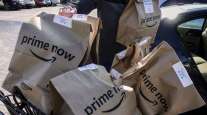San Antonio Express-News
Amazon to Roll Out Palm Payment Technology at Whole Foods

[Stay on top of transportation news: Get TTNews in your inbox.]
Customers at Amazon’s Whole Foods Market stores will soon be able to pay for their groceries with a wave of their hand.
Amazon is adding its Amazon One palm-reading payment technology to all its Whole Foods stores by the end of this year, the company announced July 20.
To use it, shoppers must either create an account online — with their credit or debit card, Amazon account and mobile number — and scan their palm over an Amazon One device when they visit a Whole Foods store, or set up an account at a store, linking their palm with their payment. Amazon Prime members who connect their Amazon One profile and Amazon account will see savings applied automatically, the company said.
Amazon launched the biometric technology in 2020 in certain Amazon Go stores.
It later expanded Amazon One to Whole Foods, which operates over 500 U.S. stores. Amazon One is already available at more than 200 Whole Foods stores.
“We are always looking for new ways to delight our customers and improve the shopping experience,” Leandro Balbinot, chief technology officer at Whole Foods Market, said in a statement. “Since we’ve introduced Amazon One at Whole Foods Market stores over the past two years, we’ve seen that customers love the convenience it provides.”
Amazon said it has recorded more than 3 million uses of the technology, and third-party businesses are “increasingly offering” it. Panera Bread is using Amazon One for its loyalty program. At Coors Field in Denver, baseball fans 21 and over can scan their palms on an Amazon One device to buy alcohol.
Amazon creates what it calls a “palm signature” based on someone’s palm and underlying veins, and the images are encrypted in the Amazon Web Services Cloud. The company said Amazon One is highly secure because that palm signature is unique, and the technology can tell the difference between someone’s palm and a replica.
Amazon said it “will never share palm data with government agencies or advertisers,” except if it must comply with a legal order and that it does not use the data for marketing nor sell it to other companies.
Amazon.com Inc. ranks No. 19 on the Transport Topics Top 100 list of the largest private carriers in North America.
Want more news? Listen to today's daily briefing below or go here for more info:
Distributed by Tribune Content Agency, LLC




